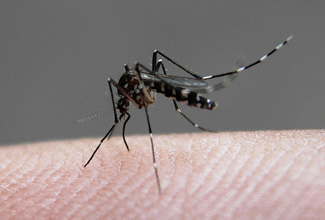 A vector is any organism that is capable of transmitting a pathogen or infective agent to another organism and a vector-borne disease is any illness derived from the action of a vector. Examples of vectors include mostly parasites like mosquitoes, rats, flees, ticks, flies.
A vector is any organism that is capable of transmitting a pathogen or infective agent to another organism and a vector-borne disease is any illness derived from the action of a vector. Examples of vectors include mostly parasites like mosquitoes, rats, flees, ticks, flies.
Common vector-borne diseases include: Malaria, Dengue Fever, Leptospirosis and Rabies. These diseases are troublesome and may be hard to treat, and as horrifying as that might sound, they are easily prevented. So in this case, the common Jamaican saying is true; “Prevention is better than Cure”.
MORE: 7 Ways To Control High Blood Pressure
Since the management of the different vectors varies; We have prepared a number of useful tips to help you and your family draw a line on one in particular: The Mosquito.
In the Home
- Wash all flower vase or water holding containers and change the water every two days. This removes mosquito eggs that might be on the inner aspect of the container and changing the water prevents mosquito larvae from maturing. Water is the breeding place for mosquitoes.
- Mesh all ports of entry for mosquitoes to your home, example, windows and doors. This proves very effective in keeping them out.
- If funds are not available to mesh the house, then keep windows and doors closed as the evening sets in to prevent mosquitoes from entering.
- Use insect sprays or plug-ins as tolerated to kill mosquitoes that are already present.
- Apply repellants to skin or clip-on to clothes as tolerated to ward off mosquitoes and prevent bites. DO NOT use if you are allergic to the product!
- Wear long sleeves and pants or clothes that protect the skin from mosquito bites if you have to go outside.
- Sleep under mosquito nets to protect you from mosquito bites especially children.
- Bore holes in used food cans and tins before disposing to prevent water from collecting in them.
Outside the Home
- Search the yard for all objects that have the potential to hold water and turn them over or get rid of them, example, old tyres, cans, pots etc.
- If you cannot get rid of certain containers which contain water, you can pour oil (not the flammable type) on the water and this will create a seal that prevents mosquitoes from laying eggs in it and prevent larvae that are already in it from getting out.
- Cover drums containing useful water to prevent mosquitoes from entering.
- Inform Public Health Inspectors if waste water is creating nuisance near your home.
- Inform the relevant authorities to fog the area frequently to kill mosquitoes.
Mosquitoes are pesky insects which are both annoying to see and hear, however if you follow the above mentioned tips then you will not have to worry about them biting you or your loved ones because small bites can be a big threat!
Photo credit: pixabay.com


